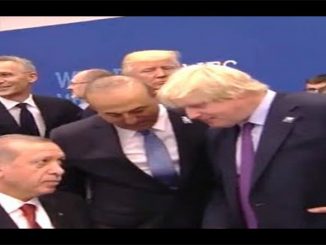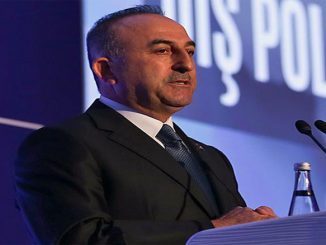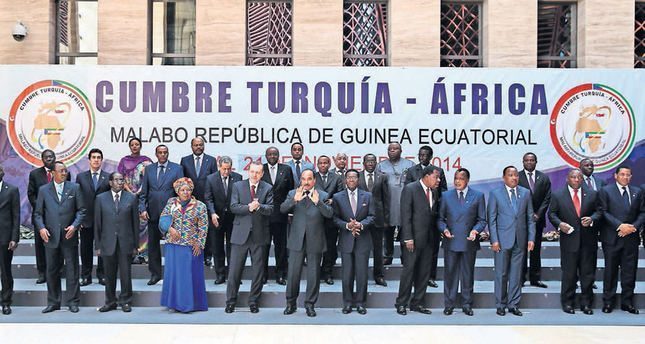
Turkey’s moves to gain more influence in African trade is “at the point of no return” and “should go on” despite the presence of giant competitors on the continent according to economic analysts.
Turkey has increased its interest in the largely developing Sub-Saharan countries over the past decade and has had a significant impact in the Horn of Africa region. Sedat Aybar, an economist from Istanbul’s Aydin University, said Turkey is at the “point of no return” in the region, and its opening-up to Africa should be supported for the country to reach “the strategic place Turkey has drawn for herself as a global player in world affairs,” according to Daily Sabah.
Turkish policy focuses more on East Africa, where its influence is stronger than in any other region; as Aybar puts it, the horn is “an important bridgehead for Turkish entry into Sub-Saharan Africa.” Somalia is the first country that enjoyed Turkish donations of more than $360 million in recent years, according to Foreign Ministry figures, and Turkey has also given away more than $1 billion to African countries so far, Aybar said. Turkey’s presence in Somalia became prominent, when then-prime minister Erdoğan paid a visit to the country in 2011 to attract the world’s attention to a famine crisis. Recently, Economy Minister Nihat Zeybekci was in Addis Ababa and signed a deal to lease a 5 million square meter area for 99 years to build a trade center for Turkish companies. “Somalia also provides a case for promoting Turkey’s opening-to-Africa strategy, which is officially based on humanitarian grounds,” Aybar said, as Turkey enforces a policy of “African solutions to African problems,” said the Turkish daily.
Ethiopia Africa’s top investment destination for Turkey
The Turkish ambassador to Ethiopia had disclosed that Ethiopia remains the biggest recipient of Turkish direct investment in Africa, reported Sudan Tribune.
Turkish investors creating 10,000 jobs in Ethiopia
Speaking in Ankara this week, Ethiopia’s Ambassador to Turkey Ayalew Gobezie pointed to a deep-rooted history between Turkey and Ethiopia which allowed the two countries to grow financially and politically. Gobezie said Turkish investors have created more than 10,000 permanent jobs, with companies up and running in the east African nation often dubbed the “Cradle of Mankind” , reported Anadolu Agency.
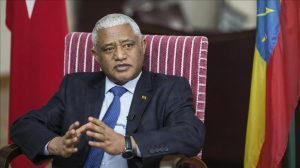
The ambassador highlighted the beginning of relations between Ethiopia and Turkey which go back to the Ottoman Empire.
“The date goes back to 1896, when the Ottoman Empire was ruled by Sultan Abdul Hamid II and Emperor Menelik II ruled the Ethiopian Empire,” said the envoy. “The first Ottoman-Turkish consulate was opened in Ethiopia in 1912.”
Turkey’s first embassy in Sub-Saharan Africa was opened in Ethiopia in 1926.
Gobezie said: “There have been frequent visits by high-level government officials to the two sisterly countries.
“We can say that Ethiopia and Turkey have excellent bilateral relations which are characterized by ever-growing economic and political ties based on common understanding and mutual respect.”
The ambassador added that the leadership of both states were “fully committed to strengthening” already-existing bilateral relations.
Gobezie recalled the visits to Turkey by the late Prime Minister of the Federal Democratic Republic of Ethiopia Meles Zenawi in 2007 — who died in August 2012 — and current president Mulatu Teshome in August 2015.
Turkish President Recep Tayyip Erdogan and Economy Minister Zihat Zeybekci visited the country back in January 2015, with a number of high-level officials and business people.
“Turkish investor companies like Ayka Addis and BMET Cable, with several others, have set up various investment activities in our country,” said Gobezie.
“Currently, many Turkish companies have started their production and created more than 10,000 permanent jobs for Ethiopian citizens and their total capital reaches to $3 billion,” he added.
The envoy highlighted the country’s youthful demographic, saying half Ethiopia’s 100-million-strong population is aged between 15 and 30.
“More than 25 million children in Ethiopia are in primary schools,” Gobezie said. “Most African countries are populated by around 20 million.”
The envoy said the high proportion of young people had created a “challenge” to create jobs. Ethiopia’s unemployment rate is around 17 percent.
$400 million trade with Turkey
Gobezie also said trade-cooperation between Turkey and Ethiopia was growing and trade volume had reached over $400 million according to 2015 data.
“Our main exporting products are coffee, sesame, oil seeds, flower, spices, pulses, cereals, textile garments, leather and leather products,” said the envoy.
“Almost half of the investments that are coming to Ethiopia are made by Turkish investors,” Gobezie added. “Ethiopia benefits more from Turkey and currently needs more investment from Turkish companies.”
The ambassador also stressed Ethiopia’s cultural richness, including 10 historic and cultural world heritage sites recognized by UNESCO.
“We were also awarded with ‘World Best Tourist Destination Award’ for 2015,” the envoy added, calling on Turks to visit the country.
Despite many promising aspects aside, Ethiopia — like Turkey – is also facing a state of emergency.
In October, the state declared a state of emergency following months of anti-government protests and unrest in the Oromia region.
The envoy said domestic protests had arisen from economic issues and said the government was currently trying to take different measures.
“Given the appalling actions of the destructive forces on the lives of people, damaging investment projects and infrastructures, the government was obliged to declare the state of emergency,” Gobezie said, adding the country had been able to restore law and order.
Ambassador Gobezie said business in the country “can be conducted as usual” and a ban on diplomats traveling in the country without permission had been lifted.
Despite the unrest, Ethiopia has achieved seven of eight UN Millennium Development Goals and witnessed double-digit economic growth. Real GDP growth in Ethiopia averaged 10.9 percent between 2004 and 2014.
The country is currently developing hydro-electric, solar, wind and geothermal energy projects. It is also working on sugar, railway, road and industrial park projects with the aim of creating job opportunities for more than 1.2 million people.
Ethiopia has set itself the goal of being a middle-income country by the year 2025.
Ethiopia: Government to sell 75 per cent stake to Turkish Bedisa Group
Ethiopian government is set to cede 75 per cent shareholding of Beles Sugar Project located in Amhara region, to Turkish company Bedisa Group for $ one billion, according to Jeeska Africa Online.
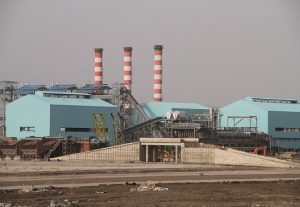
The Chairperson of Bedisa Group, Binai Boran said that he was negotiating with the government to form the joint venture for the last three years. “The negotiations are bearing fruits and we are going to take over 75 percent of Beles I and II,” he noted.
The total value of the two projects are estimated to be around $1.4 billion and Bedisa will invest a little over one billion of this amount to secure the JV deal. The Group is planning to finance a portion of the investment project by its own while the remainder of the project cost is expected to be paid for by accessing loans from local and international banks.
According to Boran, the agreement between Bedisa and the Ethiopian Sugar Corporation will be signed at the end of this year and the sugar factories will start crashing sugarcanes at the second quarter of the next year. A total area 50,000 hectare is expected to be covered by sugarcane plantation serving the two sugar crashers. Both the plantation and other water requirements are expected to be supplied by Beles River through a diversion weir built on it.
He further that he decided to invest in Ethiopia based on the directions that he got from President Recep Tayyip Erdogan, Prime Minister Binali Yildirim and Turkish Ambassador to Ethiopia, Fatih Ulusoy.
The Ethiopian Sugar Corporation data reveals that the country’s annual sugar consumption is more than 700,000 ton, from which only 440,000 tons of sugar is produced in the country. The Growth and Transformation Plan (GTP) not only needed to fill the demand and supply gap that has existed in the market for many years. But, it also aspires to export sugar to earn foreign currency. That is why the Sugar Corporation made a deal with the Metals and Engineering Corporation (Metec) to construct ten sugar factories at a time. Since Metec failed to deliver the projects, seven of them were snatched from it by the government.
The Chairperson of Bedisa Group also noted: “We know that the Ethiopia government have challenges to build the sugar factories. They were looking for international partners and that is why we want to form this joint venture” He also pointed out that the Group’s experience in international market will bring success in the joint venture by exporting sugar to African countries and the rest of the world.
The Group also has an intention of exploring other sectors in Ethiopia; but at first it wants to achieve in Beles project. The Chairperson also stressed the roles of Ethiopian Embassy and the Ethiopian Sugar Corporation officials in encouraging them to invest in Ethiopia.
Bedisa Group was founded more than half a century ago and constructed several tunnels, galleries and dam all over Turkey and Saudi Arabia during 1965-1986. Besides Bedisa together with group companies, works actively in the fields of international business and investment. Bedisa Group also prefers products and reputable partners from United States of America to China across 59 countries in six continents.
In a related news, Molino Mechanical Industry and Trade Inc. is looking a partner to set up a food city complex in Ethiopia. The company’s Vice President, Salim Alaybeyi, said that his company is looking for well established and knowledgeable companies that is specialized in the sector. He believes that the food city complex will address the market need in Africa. The complex will be established with a $55 million capital and produce wheat that are going to be exported to Africa.
“Since the transport cost from Turkey to Africa is expensive, I want to set up a food city complex in Ethiopia so that I can be competent in the African market,” noted the vice president. He promised to start the project as soon as he was done with the partner selection process. He said that the Industry Minister, Ahmed Abitew, promised to help him in connecting with the right partner as well as in facilitating the bureaucratic process to set up the food complex.
Molino was founded in 1995 and manufactures flour milling technology. Molino performs its activities in a wide-range, such as flour and semolina mills, grain silos, seed cleaning units, pulse sieving and packaging plants, pneumatic and mechanical conveying systems.


